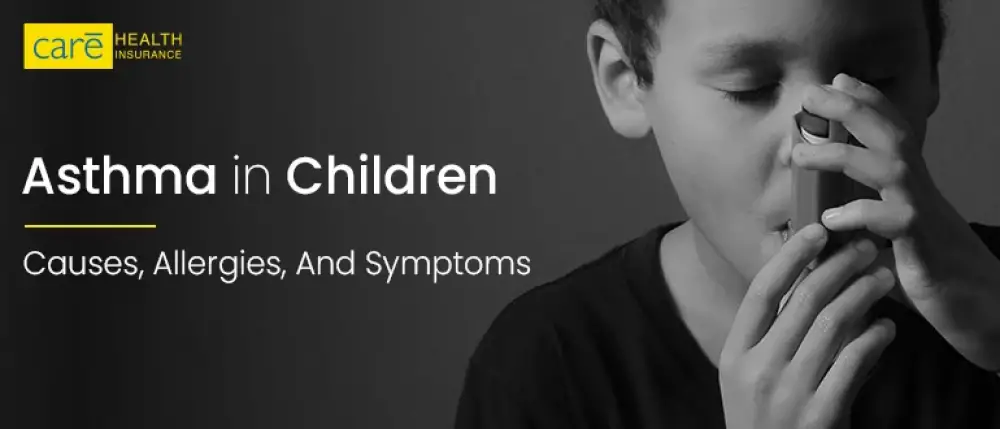Subscribe to get weekly insights
Always stay up to date with our newest articles sent direct to your inbox
Published on 4 Sep, 2024
Updated on 27 Mar, 2025
375 Views
5 min Read

Written by Riya Lohia
favorite0Like
favoriteBe the First to Like
Asthma in children shares many similarities with asthma in adults. It is a significant cause of increased ER visits, hospital stays, and missed school days. However, you must overcome specific challenges to maintain the respiratory rate in children.
Unfortunately, there is no cure for asthma in children. Symptoms may persist into adulthood, but with careful management and consistent routine you and your child can effectively control them.. This blog post discusses the rising prevalence of asthma, respiratory issues, and allergies in children. Read to know more.
Asthma is a chronic inflammatory condition that affects the airways, making it difficult to breathe. In children, asthma attacks can be triggered by infections, allergens, exercise, or cold air. Asthma causes the airways to narrow and become inflamed, leading to symptoms such as:
Asthma symptoms in children can vary. Some may experience occasional flare-ups, others may face difficulties with breathing.
It can be difficult to distinguish between asthma symptoms and those of common respiratory illnesses in children. However, asthma symptoms in children are typically long-lasting and can significantly impact their quality of life. Here are some typical asthma symptoms:
Additionally, here are some other asthma symptoms in children:
Toddlers May Experience:
Older Children May Experience:
Triggers can worsen asthma symptoms in children and lead to an asthma attack. Common triggers include:
Several factors can contribute to the development of asthma in children:
1. Allergies: Allergies significantly increase the risk of developing respiratory disorders, and specific allergy symptoms can trigger asthma.
2. Genetics: A family history of allergies or asthma increases a child's likelihood of developing asthma or other respiratory illnesses.
3. Infections: Frequent airway infections, particularly in children under age 5, are a major cause of respiratory distress.
Diagnosing asthma in children– especially those under five years of age–can be a complex process. It takes thorough evaluation of symptoms, medical and family history for doctors to conduct a diagnosis.
Here are the common diagnostic tests for asthma in children:
There is currently no cure for asthma. Treatments focus on reducing asthma symptoms and respiratory distress and preventing airway inflammation. Both at-home and clinical treatment are effective and helpful in managing the symptoms.
Some children might need medication to manage their asthma symptoms even with lifestyle modifications. These asthma medications may include:
Although many of these drugs can be given in different ways, nebulisers and oral pills work best for treating younger children.
Several at-home measures can help reduce the frequency of asthma attacks and improve respiratory function in children:
When a person has an allergy, their immune system reacts to an allergen–a substance that triggers allergic reactions. The immune system perceives it as a foreign body. While various substances can trigger asthma, the most common allergies in children occur due to moulds, pollens, dust mites, and pet dander.
Specific food allergies can also trigger strong immune system reactions in children. These allergies can significantly impact the immune system and contribute to respiratory disorders.
Once you know of your child’s asthma/food triggers, you can help avoid exposure and make lifestyle adjustments. Here’s how:
Helping your child stick to their asthma treatment plan and take their controller medications on time is crucial. Here are some additional tips to keep your kids healthy and minimize the risk of asthma complications:
An asthma attack can quickly turn into an asthma emergency. Especially when it comes to children, you might not want to take risks. However, if you take quick action, you can reduce the risk of asthma in children. If the asthma attack symptoms still appear after medications, follow up with your child’s doctor to restudy the asthma action plan.
It is highly recommended that you invest in a proper health insurance plan for your family. Care Health Insurance offers you numerous plans that can provide coverage for you and your children. Depending on your insurance needs and your budget, you can choose between an individual or a family floater plan.
>> Also Read: Does Your Health Insurance Provide Coverage for Asthma Treatment?
Disclaimers: The above information is for reference purposes only. For more details about the health insurance plans and their benefits please refer to the sales prospectus, policy terms, and conditions.
favoriteBe the First to Like
शुगर कंट्रोल कैसे करे? जानें, डायबिटीज में क्या खाना चाहिए Vipul Tiwary in Health & Wellness
Thyroid : मामूली नहीं हैं महिलाओं में थायराइड होना, जानें इसके लक्षण और घरेलू उपचार Vipul Tiwary in Diseases
हाई ब्लड प्रेशर को तुरंत कंट्रोल कैसे करें? देखें इसके उपाय Vipul Tiwary in Diseases
प्लेटलेट्स की कमी के लक्षण, कारण और इलाज क्या है Vipul Tiwary in Diseases
Non-Autoimmune Disease: Types, Symptoms, Causes, and More! Sejal Singhania in Diseases
Pernicious Anaemia and Stomach Cancer: The Connection Explained Sejal Singhania in Diseases
Understanding and Treating Muscle Cramps in the Rib Ritika Malik in Diseases
Hyperpigmentation: A Complete Guide to Its Causes & Treatment Mudit Handa in Diseases